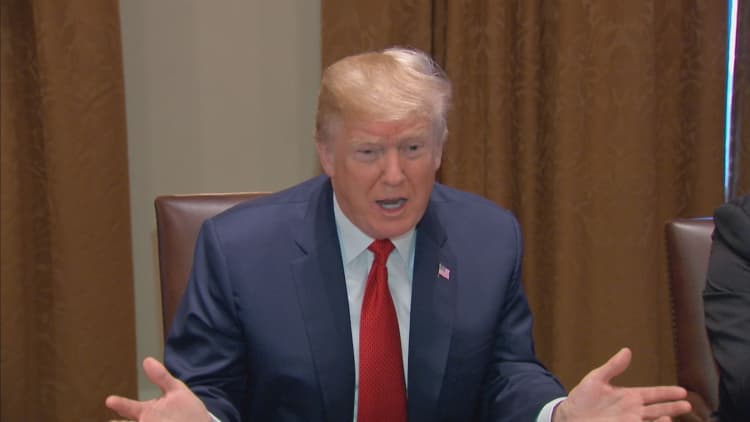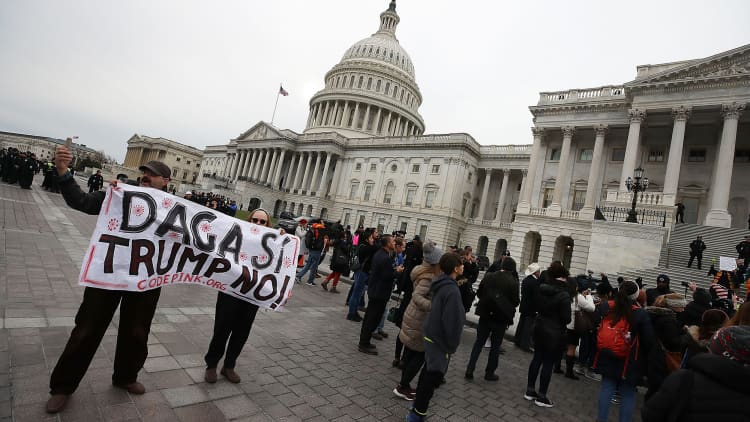Congressional leaders are moving closer to a long-term spending deal with the clock ticking down to what would become the second partial U.S. government shutdown in less than a month.
Senate leaders could announce an agreement to boost spending for defense and domestic programs as soon as Wednesday. A day earlier, President Donald Trump said he would "love" to see a shutdown if Democrats do not get behind his immigration demands. The government's funding authority lapses at the end of Thursday.
Senate Majority Leader Mitch McConnell, R-Ky., and Senate Minority Leader Chuck Schumer, D-N.Y., showed optimism Tuesday about the progress toward a deal. They may have to extend funding for only another few weeks while they hash out the longer-term agreement.
Still, multiple factors could cause any deal reached by the chamber to fall apart before the deadline.
On Tuesday night, the GOP-controlled House passed another stopgap bill to extend government funding through March 23. The Senate likely will not approve that legislation and send a different version back to the House. The Senate's bill could reportedly fund the government for the short term, extend the federal debt ceiling and authorize relief funds for last year's string of natural disasters.
McConnell said Tuesday afternoon he was "optimistic that very soon we'll be able to reach an agreement" on a more stable spending plan to pass after a shutdown is averted. While specific terms of the deal appear not to be finalized, reports indicate it could fund the government for two years.
It would increase defense spending to appease Republicans, and boost domestic spending by nearly as much to meet Democrats' demands, according to The Washington Post.

Even if McConnell and Schumer get their members behind a deal, Congress is not guaranteed to avoid the second partial government shutdown of the year. A Senate stopgap spending bill could face resistance in the House on two fronts.
First, House conservatives will likely balk at an increase in funding for domestic programs. Rep. Mark Meadows, R-N.C., chair of the hard-line House Freedom Caucus, said a bill with a debt ceiling extension and disaster aid would likely get "zero support" from the group, according to The Washington Post.
The other side of the aisle could also hesitate to support it. House Minority Leader Nancy Pelosi, D-Calif., said Wednesday that she would oppose an emerging Senate spending deal unless she gets a commitment that the chamber will allow an open debate on immigration legislation.
Pelosi has sought a bill to protect hundreds of thousands of young immigrants from deportation as part of an agreement to raise spending levels. Democrats' push for a solution to the Deferred Action for Childhood Arrivals program partially led to the January shutdown.
Schumer appears to have given up on that demand, as McConnell has pledged to start an open immigration debate soon.
Senate Minority Whip Dick Durbin, D-Ill., told MSNBC on Wednesday that Democrats got a "public commitment" from McConnell on immigration and added that "we're moving forward in a positive way" toward a spending deal.
During the rush to avoid a shutdown, Democrats moved their planned policy retreat this week from Maryland to the Capitol.
Even as the Senate leaders expressed optimism Tuesday, Trump said he would "love to see a shutdown" if Democrats do not back his immigration proposal. While Democrats have signaled support for some border security measures as part of a deal to protect the young immigrants, they have opposed restrictions on legal immigration proposed by Trump.
However, White House press secretary Sarah Huckabee Sanders said later Tuesday that she does not expect a spending deal this week to include specifics on immigration.
Lawmakers appear to have little appetite for another shutdown. Rep. Barbara Comstock, R-Va., who was at a meeting with Trump when he made his comment Tuesday, told the president that "we don't need a government shutdown on this." Her district includes many federal workers.
Schumer also told reporters that "nobody wants another" shutdown, "except maybe" Trump.
Sanders appeared to walk back Trump's statement Tuesday. She said the White House is "not advocating for a shutdown," and argued that a shutdown would fall on Democrats for "not being willing to do their jobs."
WATCH: This is what happens when the U.S. government shuts down



